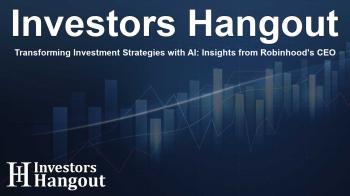Transforming Investment Strategies with AI: Insights from Robinhood's CEO

AI's Impact on Investing
Robinhood Markets Inc. (NASDAQ: HOOD) CEO Vladimir Tenev emphasizes that artificial intelligence (AI) is set to redefine the landscape of investing in profound ways. According to him, the next decade will witness a fundamental shift in how individuals approach their finances, making investing an essential component of everyday life.
The Evolution of Investment Strategies
During a recent podcast discussion, Tenev highlighted how the disruption caused by AI in traditional job frameworks will transform investment from being a luxury to a necessary strategy for securing financial stability. In his view, as more jobs become automated, individuals will increasingly turn to investments as a means to ensure their financial future.
The AI Investment Paradox
One of Tenev's key arguments revolves around the paradox presented by AI in terms of wealth generation. While it currently concentrates wealth among major tech companies, he anticipates that in the long run, AI will create opportunities for more independent endeavors, allowing individuals to establish their own single-person businesses.
Creating New Jobs
He believes that AI will not simply replace jobs; instead, it will evolve the nature of work, resulting in new roles that combine human creativity with machine efficiency. This shift requires individuals to adapt quickly and become adept at utilizing AI tools to avoid falling behind in an increasingly tech-driven economy.
Challenging Retail Investor Stereotypes
Tenev also tackled the misconceptions surrounding retail investors, pointing to outdated beliefs that they consistently underperform compared to institutional investors. He referenced the Robinhood Investors Index, which tracks user performance against broader market indicators, indicating that retail investors are showing significant engagement in technology and innovation sectors, leading to varied investment outcomes.
Younger Generations and Investment
Many younger investors view their spending on stocks as an alternative to discretionary purchases, underscoring a cultural shift where investing is seen in tandem with lifestyle choices and experiences.
Lessons from the GameStop Scenario
Reflecting on the turbulent moments during the GameStop trading frenzy, Tenev described the period as chaotic, marked by swift regulatory changes that forced Robinhood to temporarily limit trading in specific stocks. The communication fallout taught the company the importance of transparency and clarity in crisis situations.
Future Innovations: Tokenization in Markets
Looking ahead, Tenev sees tokenization as a groundbreaking advancement in the capital markets. This innovation promises 24/7 trading capabilities, instant settlement processes, and improved access for retail investors to traditionally illiquid assets. Robinhood has already made strides by introducing tokenized US equities in European markets and is exploring similar opportunities in the domestic market.
Wealth Transfer and Retirement Solutions
The company’s growth in retirement products, now exceeding $20 billion in assets, positions it favorably to harness a significant wave of wealth transfer between generations. Tenev envisions Robinhood evolving into a multi-generational financial platform that manages family wealth, making investment accessible to broader demographics.
Calling for Regulatory Change
On the podcast, Tenev voiced his concerns about existing regulations, particularly the accredited investor rule, which he believes limits access to private investments that could benefit a greater number of Americans. By supporting changes that enable younger individuals to invest, he advocates for early educational opportunities in financial literacy.
Looking Ahead in AI and Investing
Overall, as AI continues to shape the economic environment, Tenev predicts that financial literacy will transition from being a luxury skill to a necessary expertise for survival in the evolving marketplace.
Frequently Asked Questions
How will AI change investment strategies?
AI is expected to transform investing from a luxury to a necessity, aiding individuals in adapting to economic shifts caused by automation.
What is the AI investment paradox?
Tenev suggests that while AI concentrates wealth among few, it may also enable new business opportunities for individuals through automation.
What challenges did Robinhood face during the GameStop incident?
The platform faced communication difficulties and regulatory challenges that hindered its ability to manage buy orders effectively.
What is tokenization and how does it affect investing?
Tokenization allows assets to be traded 24/7 and simplifies the process of investing in traditionally illiquid markets.
Why does Tenev advocate for regulatory changes?
He aims to increase access to private investments for a broader population and believes it will help alleviate wealth inequality.
About The Author
Contact Henry Turner privately here. Or send an email with ATTN: Henry Turner as the subject to contact@investorshangout.com.
About Investors Hangout
Investors Hangout is a leading online stock forum for financial discussion and learning, offering a wide range of free tools and resources. It draws in traders of all levels, who exchange market knowledge, investigate trading tactics, and keep an eye on industry developments in real time. Featuring financial articles, stock message boards, quotes, charts, company profiles, and live news updates. Through cooperative learning and a wealth of informational resources, it helps users from novices creating their first portfolios to experts honing their techniques. Join Investors Hangout today: https://investorshangout.com/
The content of this article is based on factual, publicly available information and does not represent legal, financial, or investment advice. Investors Hangout does not offer financial advice, and the author is not a licensed financial advisor. Consult a qualified advisor before making any financial or investment decisions based on this article. This article should not be considered advice to purchase, sell, or hold any securities or other investments. If any of the material provided here is inaccurate, please contact us for corrections.

